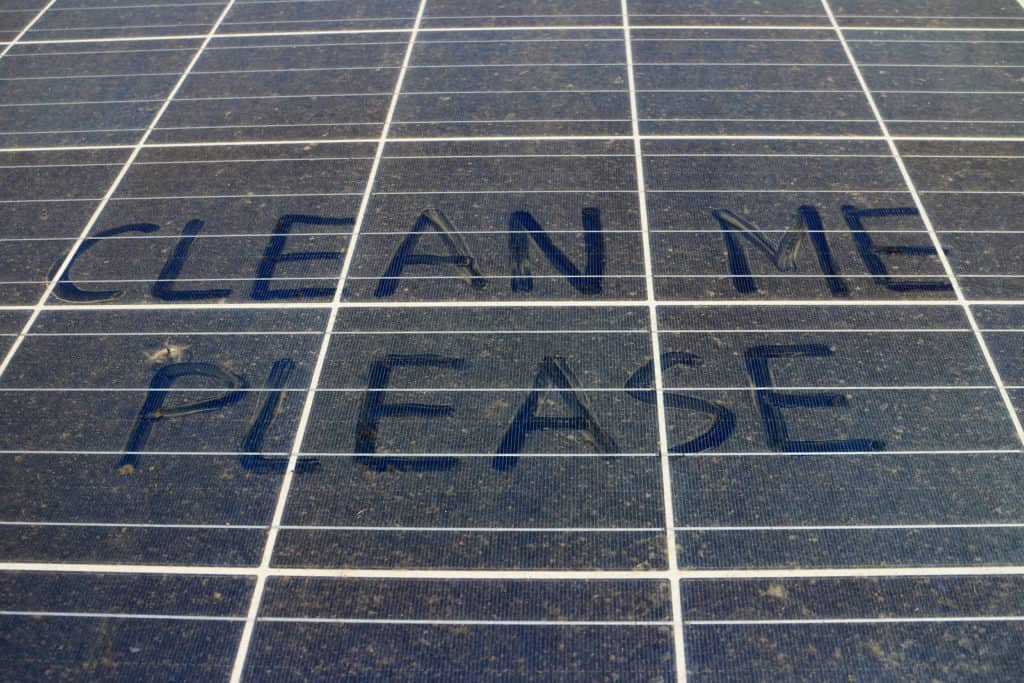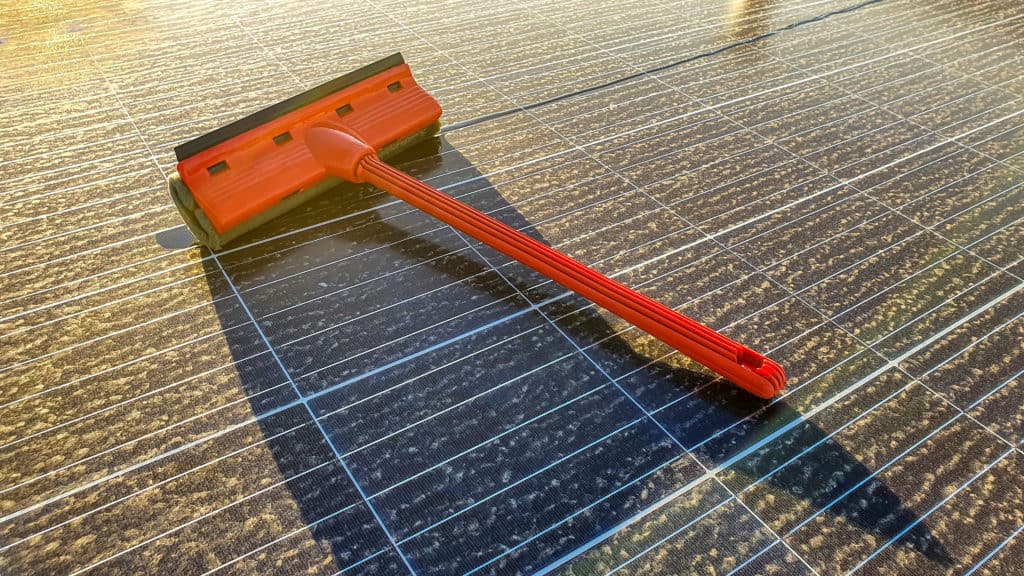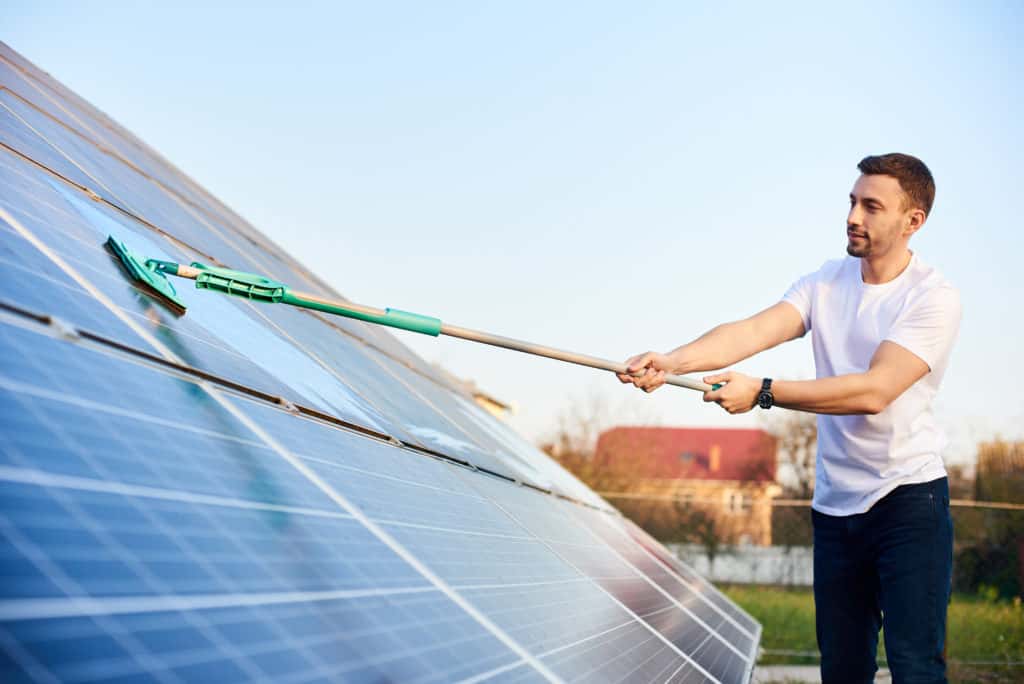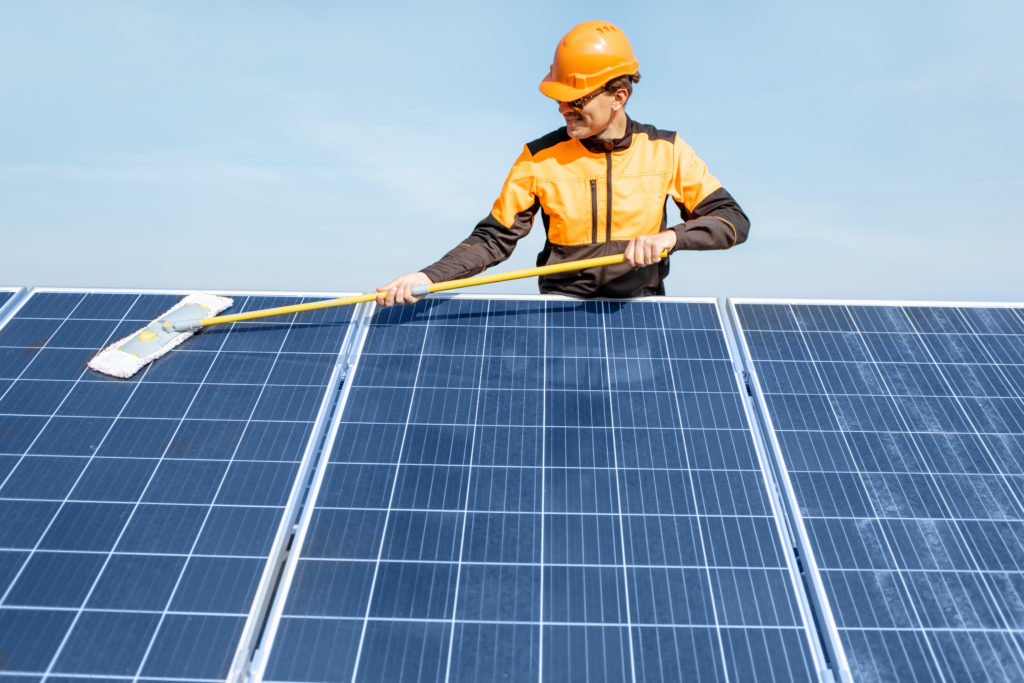
You can’t technically turn a solar panel off, which means that they will be running even while you’re cleaning it. Your rooftop solar panels probably produce enough electricity to kill you. You probably know both of those things, and quite reasonably this might cause you some distress.
If your solar panels are installed correctly, it should be impossible for them to shock you if you just touch them. Even if there are small cracks in the surface of your panel, it is fairly unlikely to hurt you while you’re cleaning it. The panels won’t be less safe wet than they are dry.
So does that mean you can relax while you’re cleaning your solar panels? For the most part, yeah. you probably won’t be in any danger of an electrical shock while you’re working. But why is it possible?
How Engineers Make Your Solar Panels Safe
Solar panels need to be kept clean in order for them to be usable, and this is something that installers keep in mind while putting your solar panels up. The person setting up your solar panels has probably had significant experience putting up solar panels the right way.
In order to make them safe to keep on your house, the engineers use insulated chords and make certain that the components that are carrying electricity don’t ever end up exposed to air. This is important, as if the chords do end up exposed, they can cause electrical fires and, relevant here, shocks to people who come in contact with them.
This is the same technology that makes all of those electrical appliances in your kitchen safe to use even though you plug hem in right next to the sink. Most devices that use chords to transfer power from your house’s electrical system use some pretty serious insulation in order to keep you safe.
This is especially important when it comes to solar panels, which produce a lot of electricity for use throughout the home. In order to make these safe, it’s important that the chords are well insulated and all of the plugs are fully plugged in.
Pretty much all installers have enough knowledge and experience to know how to get all of this done right, and so you don’t really need to worry about whether your solar panels will shock you while you’re cleaning them.
Are Your Solar Panels Safe From You?

But just because your solar panels won’t hurt you doesn’t mean that you can’t accidentally hurt them while trying to clean them.
Water is safe to use on solar panels, but a lot of soaps and detergents aren’t they can eat away at the protective layer on the top of the panel, eventually causing damage to the components inside. If you do need to use a detergent, make sure it isn’t too strong.
You’ll also want to avoid scratching the solar panel as much as you can, since you will need to avoid damaging the protective glass that coats it. To do this, you should make sure that whatever cleaning device or cloth that you’re using is soft and not too rough. A squeegee is a great option!
Do You Need To Clean Your Solar Panels?
In the modern world, cars, airplanes, and all sorts of other tools fill the air with detritus and pollutants, while many of those go off into the atmosphere, others don’t, and those can end up landing on your solar panels along with natural dirt and dust picked up by the wind.
If the glass on the surface of the panel is dirty, it will block light from getting in and it will block heat from getting out. This is bad for your panels in several ways. If your panels aren’t getting as much sunlight as they need to, they won’t produce as much electricity.
Increased heat also decreases the efficiency with which the panel is able to produce electricity. This is because silicon, the superconductor that makes solar panels work, transfers electricity best at lower temperatures, meaning that even a slight increase in the temperature inside the panel can hurt its efficiency.
This is the same reason that solar panels actually work worse when it’s hot outside than they do when it’s cold. Silicon being able to easily transfer electricity is critical to the function of most solar panels.
It can also just be kind of ugly, and you probably really want your solar panels to at least look cool.
However, in some temperate climates frequent rain or snow fall can help keep your panels from getting too dirty, meaning that in a lot of places there isn’t much need to clean your solar panels more than once every couple of years.

A study in Spain discovered that an entire year without cleaning only made their solar panels about 5% less effective than usual, which isn’t all that bad for most domestic uses.
That being said, in some parts of the world where pollution is more prevelant, the rain might actually be making your panels more dirty. If this is the case, you may want to clean your solar panels once every couple of months.
Dry places like Texas or Nevada that hardly ever get rainfall also tend to end up depositing a lot of dust on your solar panels, and in these kinds of environments it’s likely that you’ll need to clean them at least once a year if not more often.
When To Call Professionals

While usually it shouldn’t be too big of a hassle to clean your own solar panels, there are some situatioms in which it may be either cheaper or safer to just hire someone to clean it for you.
For instance, if you don’t have the proper tools toget on top of your roof or to safely clean the panels without damaging them, it may be a good idea to call in professionals.
You might also have an especially steep or tall roof that would be either very easy to fall off of or very deadly to fall off of.
If your roof is anything like mine, it’s probably covered in a series of deadly traps that could eviscerate you if you made the wrong move. In that case, it’s a wonder that you got the solar panels up there in the first place and the responsibility is on you to disarm the traps before hiring anyone to go on your roof for any reason.
This is especially true if you live in a part of the world where solar panels don’t need to be cleaned very often. It isn’t exactly a good investment to buy all of the materials to clean your panels only to use them once every five years. It’s probably better to ask someone who already has the stuff to do it for you.
The best way to get in contact with cleaners is to call whoever installed the solar panels and give them the relevant information about your roof. Either they can clean the panels themselves, or they can find another company that can clean the panels for you.
When You Should Clean Your Panels Yourself
If your house is easy to get on top of and you need to clean the panels frequently because you live somewhere like Arizona and the dirt buildup is fast enough to cause problems, you should probably just clean your solar panels yourself.
Especially if they need a lot of cleaening, it can be worth it to simply invest in the tools that you need and carefully clean the dust off of your solar panels on your own, especially if you have traps up there.
How Solar Panels Work

There are two kinds of solar power: Thermo-solar and photovoltaic. The kinds of solar panels that are used in homes are photovoltaic, meaning that they get their energy from absorbing sunlight.
They do this using silicon, a superonducter. As light hits the cell and is absorbed, it and other materials let out a large amount of extra electrons, which are then dispensed as electricity by the cell.
Essentially, a solar panel is like a batter that uses sunlight instead of chemical reactions to produce its electricity. Like a battery, a healthy solar panel is built in such a way that that electricity will all be directed towards powering your home, and won’t be lost electrocution people and animals that ome into contact with it.
This is the reason that a buildup of dust and dirt can be harmful to a solar panel’s functioning. Anything that blocks light from getting into the panel will decrease the amount of energy that it can produce.
This kind of solar panel doesn’t carry with it a lot of safety risks. Because they don’t reflect sunlight, they aren’t capable of cooking birds or blinding aircraft pilots. They can end up hurting insects that land on them if they end up overheating, but the effect isn’t big enough to be any more than a nuisance.
If your solar panels have been properly insatalled, there’s virtually no way that they could possibly hurt anyone.